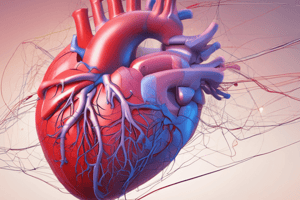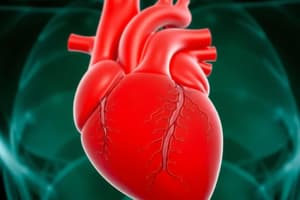Podcast
Questions and Answers
What is afterload?
What is afterload?
- The amount of blood in the ventricles before they contract
- The force of blood against the walls of the veins
- The resistance that the ventricles have to overcome to pump out the blood through the aorta (correct)
- The pressure in the atria when the ventricles contract
What increases end systolic volume (ESV)?
What increases end systolic volume (ESV)?
- Preload
- Afterload (correct)
- Blood viscosity
- Arterial wall rigidity
What factors contribute to afterload?
What factors contribute to afterload?
- Venous pressure, arterial wall rigidity, and blood volume
- Aortic pressure, arterial wall rigidity, and blood viscosity (correct)
- Venous pressure, arterial wall flexibility, and blood volume
- Aortic pressure, arterial wall flexibility, and blood viscosity
Flashcards are hidden until you start studying
Study Notes
Afterload
- Afterload is the tension or stress that the heart must generate to eject blood into the aorta during systole.
Factors Contributing to Afterload
- End systolic volume (ESV) is increased by: • Increased peripheral resistance • Increased blood pressure • Stiffening of arteries • Decreased arterial compliance
Note: Peripheral resistance, blood pressure, and arterial stiffness all contribute to increased afterload, making it more difficult for the heart to pump blood.
Studying That Suits You
Use AI to generate personalized quizzes and flashcards to suit your learning preferences.




